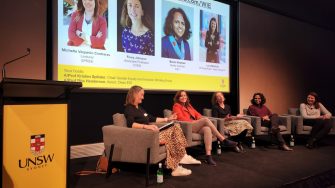Celebrating Women in Engineering
On Thursday 23 June, UNSW Engineering hosted a networking event to celebrate International Women in Engineering Day.
On Thursday 23 June, UNSW Engineering hosted a networking event to celebrate International Women in Engineering Day.

On Thursday 23 June, UNSW Engineering hosted a networking event to celebrate International Women in Engineering Day.
Held at the UNSW Kensington campus, the event was an opportunity for all to celebrate and recognise the achievements of women engineers at UNSW and to discuss current and future opportunities focused on gender equity within the Engineering Faculty and UNSW.
The evening included a panel discussion on the topic of Research Opportunity and Performance Evidence (ROPE) – initiatives that support equitable access to career advancement and research funding. Adopted by both the Australian Research Council (ARC) and UNSW, ROPE initiatives encourage applicants to demonstrate their activities, outputs and achievements in the context of career and life opportunities and experiences, including, where relevant, significant career interruptions.
Guests were welcomed by Rita Henderson, Associate Dean (Equity and Diversity), who said, “The introduction of ROPE statements was a wonderful step forward in acknowledging that not all of our academic staff members may have taken a traditional pathway to their current position and, in the context of the sometimes metrics-driven world that we work in, that their track record may not necessarily stack up comparably to others in their chosen field for a variety of reasons—most notably career breaks—but also other reasons such as ongoing carer responsibilities, teaching responsibilities, time in industry…and we may hear of other reasons this evening.”
Facilitated by Associate Professor Kristen Splinter, Chair of the Staff Gender, Equity and Diversity Working Group, the panel included four female speakers representing different career stages, backgrounds and life experiences: Dr Beena Ahmed, Senior Lecturer in the School of Electrical Engineering and Telecommunications; Dr. Michelle Vaqueiro Contreras, a research-focused lecturer in the School of Photovoltaic and Renewable Energy Engineering (SPREE); Associate Professor Fiona Johnson, an academic in the School of Civil and Environmental Engineering; and Professor Lucy Marshall, Associate Dean (Research) in the Faculty of Engineering and Director of the Water Research Centre in the School of Civil and Environmental Engineering.
The panel explored the opportunities and the challenges of ROPE, misconceptions surrounding ROPE statements and the future of ROPE in academia. They discussed the importance of applicants knowing how to tell their story and explaining the nuances in their discipline—remembering that the assessor or hiring committee may not have this existing knowledge. The possibility of creating a ROPE “library” as well as training for ROPE assessors were raised as strategies to educate on the variety of career pathways and interruptions as well as their impact.
At the conclusion of the panel discussion, Associate Professor Henderson announced that an anonymised ROPE Statement Library would be compiled to assist staff in articulating effective ROPE statements, and to assist reviewers to better understand the diversity of staff backgrounds and contexts. Participants then had the opportunity to enjoy drinks and canapes while mingling with colleagues and friends and continue the conversations raised in the panel discussion.
Associate Professor Splinter said, “We had some really insightful discussions around ROPE and it was great to see a younger crowd at the event with many PhD students and early career researchers.”
“It was also nice to just be able to network and chat with people too; I think everyone really enjoyed that as the benefits of networking have been missed during the past few years.”